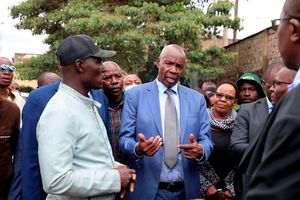Government should stop war on books

The most basic definition of illiteracy should compel us to reconsider the path we are taking, which is one that disregards the value of books. PHOTO | FILE | NATION MEDIA GROUP
What you need to know:
- Paper is like a middleman through whom information is transferred, in the form of books.
- One might be forgiven for concluding that our national aspiration is to become an illiterate populace.
- Thankfully, the government acknowledges the importance of education and wishes to enhance it.
If medicine is not affordable, our health suffers. Should farming tools become unavailable, our nutrition is in jeopardy.
Paper is the main raw material in book production, it carries the bulk cost in the manufacture of books. So, indisputably, if paper is unaffordable, education will hurt.
Paper matters. It’s one of those things we use all the time but hardly think much about. However, in the context of education, it’s a big deal.
Paper is like a middleman through whom information is transferred, in the form of books, to become the knowledge in our minds.
TAX
So why is Kenya hell-bent on taxing books so heavily? Here’s a little history on this unfortunate trend.
In October 2013, the government imposed a 16 per cent VAT levy on books. VAT is first applied on raw materials at the printing stage.
The publisher must then load their margins onto the overall production costs before adding VAT to determine the final consumer price.
So, the VAT collected by the importer of raw materials, the printer, the publisher, and the bookseller becomes a cost to the end consumer.
In 2014, the government increased the customs tax on paper from 10 per cent to 25 per cent.
BLOW TO READING
Fast forward to 2018. Our latest budget has dealt yet another blow to reading, and by extension to the quality of learning.
In the budget statement, the CS Treasury increased tax on imported paper and paper products from 25 per cent to 35 per cent.
Books are officially becoming luxury items in Kenya. Pause to consider if books become luxury items, so does knowledge.
One might be forgiven for concluding that our national aspiration is to become an illiterate populace.
Ironically, in the same budget, the CS set aside Sh5 billion to cater for the deficit of teachers in the country.
Thankfully, the government acknowledges the importance of education and wishes to enhance it, but with what will the teachers study and teach?
The reasoning behind the steep customs duty on paper bears close examination. The CS did provide an explanation for increasing the already steep tax on paper — to protect the local manufacturer of paper.
It was the same reason given for the 2014 increase. There are two glaring problems with this elucidation.
PAPER MILL
First, Kenya has no paper industry to speak of. It is common knowledge that the country’s largest paper mill, Webuye’s Rai Paper, formerly Pan Paper Mills, was struggling prior to 2014, and has continued to struggle.
The paper mill was revived (for the n+1 time) last year but is still not fully operational. Could it be that imported paper has nothing to do with what ails the company?
The only consequence is a further rise in the cost of books, and therefore in the cost of learning.
The most basic definition of illiteracy should compel us to reconsider the path we are taking, which is one that disregards the value of books.
Illiteracy, in its simplest definition, is ‘the inability to read or write.’ Both require books and books require paper.
The writer is Chief Learning Officer, Will to Win Global ([email protected])




